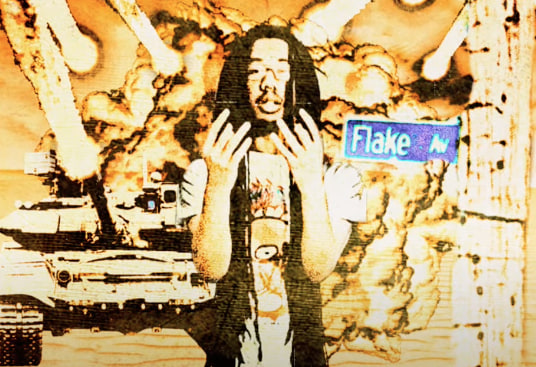Photo by Jenny Berger Myher
Serge Lutens’ perfume department describes Iris Silver Mist as a luminous, graceful and elegant fragrance. To Jenny Hval, it smells like the ghost of a flower. The Norwegian singer, composer, and multi-instrumentalist, who’s spent the past 20 years releasing symphonic, experimental pop, found the fragrance on a path of perfume rediscovery, an aroma obsession that began as she toured her 2022 album Classic Objects. For the first time since her teenage years, she found herself fascinated by the tiny nuances that define the concentrated liquids we spray into the air, catching their droplets on our skin.
It was perfume, specifically the ISM fragrance, that inspired the songs on her new album, out May 2 on 4AD. “A rose is a rose is a rose is a cigarette,” she sings on Iris Silver Mist’s second track, “To Be a Rose,” going on to describe a stage “decorated with cigarette smoke from a hundred, no, from thousand mouths in synchrony.” The smells of roses and cigarettes, and all the associations they bring with them, commingle above steady drums, guitar, and synth string swells.
Elsewhere, she dreams of other scents: a burger, birthday candles, burnt resin, spilt beer, and a perfumed wrist. But flowers and cigarette smoke are never far away. Speaking to The FADER, Hval discussed her return to perfume, her smell memories, and how she fell back in love with the “normcore” scent of a rose.
The FADER: What prompted your journey into the perfume world?
Jenny Hval: I was very interested in perfume as a teenager. Not a little bit, but very. I didn’t grow up around people who wore or discussed fragrance; Norway has been a bit removed from perfume I think. But I discovered the tax-free store on the ferry to Denmark when I was about 12, and found it to be as exciting as the dance floor. I could go there and become different people. I remember reading what I could about perfumes and learning about [the French city] Grasse, where you could get education. But I never understood that perfume was an artform, [or] that my sense of smell had anything to do with my eyes and ears and their interest in literature and music.
I drifted away from perfume in high school and forgot all about it until after the pandemic. I was very fatigued from music being so removed from the physical realm. With streaming platforms and social media taking the place of record stores, music criticism, and, to an extent (especially during the lockdowns), live music… the musician part of me [felt like] a ghost. But I couldn’t have realised that so fully without going into some niche perfume shops, smelling some fragrances, and becoming completely flooded with memories and emotions. Both music and scents can have this immediate effect on us — they can throw us into a state, or back to our past, or give us a very concise feeling of being somewhere else.
I am particularly interested in scents that feel like they transform your skin somehow. Whether it’s a musk that’s slightly dirty, a fruit peel accord that makes me feel like I’m an apricot, or a ghostly, rooty iris that rearranges the body so the bones are on the outside and the skin is the filling.
“I am particularly interested in scents that feel like they transform your skin somehow. Whether it’s a musk that’s slightly dirty, a fruit peel accord that makes me feel like I’m an apricot.”
Tell me about discovering the Iris Silver Mist fragrance. Why does it feel like a ghostly smell, and why are you drawn to that?
I read about Iris Silver Mist before I tried it, because it’s so hard to come across. While I started writing my album, I read (or heard in a YouTube video, or both) that this perfume would be what the ghost in Hamlet could wear. That comment made an impression on me… a perfume that a ghost could wear, and a murdered king even. That comment probably resonated with me because it was how I thought of myself as an artist — a ghost from a time when music mattered, still hammering away — and my record, which to me was sounding ghostly and was invaded by hazy, smoky and powdery textures. Ghost sounds.
“A rose is a rose is a rose is a cigarette” riffs on Gertrude Stein’s “Sacred Emily.” How did you choose that poem?
That quote (misquote, as she never wrote “A rose”, but “Rose is a rose”) came very late to the lyrics, after I wrote all the rest. It’s a bit cheeky, because I read “Sacred Emily” maybe 25 years ago, but perhaps [I’m] saying something about how when you repeat a word in a musical context, it is never the same; it’s always transforming. In music, we can change the meaning of words, of the real world. Unlike a written word on a computer, but more like the crossroads between handwriting and abstract drawing.
I’m probably not doing Gertrude Stein justice, but that’s not why we quote things!
“It was how I thought of myself as an artist — a ghost from a time when music mattered, still hammering away.”
What about roses brings to mind cigarettes for you as another example of romantic wishful thinking?
I used to really struggle with roses before I got into perfume. I found the rose to be a symbol of the most normcore, capitalist, heterosexual and stereotypical Valentine’s Day kind of love. But then I smelled the roses and they became part of the real world again. And there are so many beautifully scented roses — citrusy, waxy, sweet and deep. When the wind blows in a rose garden, it’s like nature having the most incredible cigarette and blowing a smoke ring your way.
Does the association come from a particular smell memory?
I don’t have a lot of memories of rose scents. Of course, I did make rose water as a kid, and my parents were probably smoking in the same room. I do love a smoky rose. Perhaps that is why. Cigarette smoke is for me the scent of childhood, of staying up late with the grown-ups, of longing. And of hanging out with the older cool kids. I never smoked.





